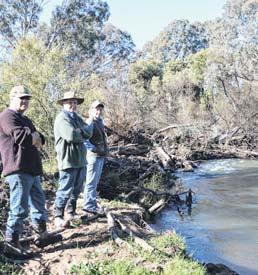

A grant for new bugles will allow Ben Thomas to perform The Last Post authentically to honour the ANZACs at tomorrow’s service.
■ Story page 2 PHOTO: Kurt Hickling AUTHENTIC BUGLE FOR THE LAST POST











A grant for new bugles will allow Ben Thomas to perform The Last Post authentically to honour the ANZACs at tomorrow’s service.
■ Story page 2 PHOTO: Kurt Hickling AUTHENTIC BUGLE FOR THE LAST POST


















WANGARATTA High School executive principal Dave Armstrong believes the wider community is the “missing link” in safeguarding young people from excessive use of devices and social media apps.
Admitting to grappling with the issue both as an educator and a parent, Mr Armstrong said while there were definite benefits to emerge from the technology, smartphones posed a significant distraction for teenagers, and this was being regularly noticed at school.
“I think this whole issue needs a lot more attention,” he told the Wangaratta Chronicle.
“While our generation had a playbased adolescence, our children are having a phone-based adolescence.
“(Excessive use of mobile phones) is linked to depression and anxiety; we



are creating an anxious generation.
“Never has youth mental health been so bad; other things have happened too, of course, like COVID, but there is a direct link between (excessive) use of smartphones and poor mental health.
“As parents, we’ve put more controls in place and stopped young people doing things we used to do, like playing outside and going out all day, but have allowed - through smartphones - unchecked, uncontrolled access to the internet 24/7; we didn’t see the danger right in front of us.
■ Continued page 3

DISTRACTED and impaired drivers will be a key focus for police over the ANZAC Day long weekend.
Operation Tribute is a statewide operation that will run from 12.01am on Wednesday, April 24 until midnight on Sunday, April 28.
Community needed to
During this period police said they will be “out, anywhere, anytime”.
“Local police with specialist units will be concentrating on the major arterials and people can expect officers to be out both locally and in those remote areas,” Sergeant Shaun Hillier of Wangaratta police said.
“We’re obviously concentrating on not only the Hume (Freeway) and people travelling to those holiday destinations as they typically do over these long weekends.”
Sgt Hillier is urging people to drive safely, saying police’s highly visible presence across Victoria in both metro and regional areas seeks to deter
poor road-user behaviour.
He said key focusses will be speed, impaired driving, fatigue, driver distraction and seatbelt non-compliance.
“We’re anticipating high volumes of traffic over the weekend, so allow plenty of travel time, take regular breaks and most importantly, be patient and courteous to
other road users,” he said.
“Whilst ANZAC Day falls on a Thursday we know many people will plan for a long weekend and travel to regional areas.
“If you are travelling this long week end you can expect to see a high visible police presence.”
Last month 29 lives were
lost on Victorian roads compared to 21 in the same month last year with 59 per cent of those occurring on regional roads.
So far this year, 90 lives have been lost on the roads across the state, three of which have occurred within the Wangaratta Police Service Area.
back local school efforts to curb smartphone use
■ From page 1
“I think we often don’t realise this is happening around us.
“We have unwittingly allowed tech companies access to our children and allowed them to ‘engage’ with our children in ways that are nothing like the real-world experience with others that they need to learn about socialisation, communication and real engagement.
“This virtual ‘engagement’ is engineered for addiction and is sedentary, isolated, artificial and incompatible with childhood and adolescent development.
“Smartphones are, in hindsight, one of the biggest uncontrolled experiments on humans in history, with every one of the tools they feature designed with addiction in mind.
“I think we’ve lost perspective.”
The high school follows the State Government’s policy on mobile phones in schools, introduced at the start of 2020, which requires all phones to be switched off and stored securely during the school day.
“Phones can have educational benefits, but they’ve got to be really, really tightly controlled,” Mr Armstrong said.
“During a school day, they are a distraction, and are taking away from learning.
“They’re so pervasive, and it’s the times they’re used in such a bad way, such as in cyberbullying, that are really concerning.
“We want to have this time at school as a sacred time for learning, socialising and play.”
The high school’s mobile phone policy was updated in 2022 with a change to consequences for breaching the rules; confiscated phones are now returned not to students, but to parents or guardians, who are asked to collect

WHAT do you think about the issues raised in this story? If you have a strong opinion, email us a letter to the editor at edit.chronicle@nemedia.com.au
Keep you opinion under 250 words and provide your name and contact number.

them no earlier than the next day.
“The ban had already been implemented, but in 2024 we have really been consistent, persistent and relentless in the application of the policy, because it was becoming a real point of conflict,” Mr Armstrong said.
“The consequences are an important part of the ban.”
Mr Armstrong said he was hopeful more parents would hold off as long as possible on putting a smartphone into their children’s hands.
“I’d encourage parents to talk among their peer groups, and band together to say, ‘We’re going to wait to provide a phone’, particularly in primary school, and as long as possible after that,” he said.
“If it’s seen as critical (for them to have one), a non-smartphone which only allows phone calls and text messages is better for primary-aged students.
“The same applies for early adolesence, when I advise parents to hold off as long as possible from providing smartphones, to allow life
experience and maturity to develop; I recommend that social media should not be accessible before 16 years of age.”
Mr Armstrong said young people were not effectively learning the nuances of direct personal contact, and in many cases were addressing large numbers of people at once in social media chats, which required skills they had not yet developed.
“When sending messages to a large group, young people will of course worry about their reputation; making a mistake or not doing well can affect how many people see them,” he said.
“Because of this, online communication is often more about showing off, can cause more stress than simple face-to-face talks, and is a significant driver of anxiety.
“Kids experiencing puberty online often face more issues - like constantly comparing themselves to others, feeling self-conscious, dealing with public embarrassment, and ongoing anxiety - than
teenagers in past generations.
“This can make their developing brains constantly defensive.
“If you go to any school, you will see this issue is a big challenge, but we aim to have our students turn off their phones at 9am for the entire school day.
“We also encourage parents not to ring or message during the day; if there are urgent messages, they can be relayed through the office.
“We have to consider that when our child is at school, they are uncontactable via mobile phone.”
Mr Armstrong said the other key thing parents and the community could do was support more free play, independence and responsibility in the real world.
“Play sports; walk to the shop to buy milk for the family or do other errands; go on school camps; do community service; walk to meet friends and relatives: the same level of freedom that most adults experienced when they were young,” he said.
WANGARATTA’s air quality reached the “very poor” level at 8am yesterday, as smoke haze continues to impact the rural city and surrounding areas.
According to the Environment Protection Authority (EPA) AirWatch monitor, the city enjoyed good to fair conditions on Sunday, climbing to a poor and a very poor spike on Tuesday morning, before dropping back to fair.
A poor, very poor or extremely poor category is reflected when the level of a pollutant registered is higher than its air quality guideline or standard.
The EPA advises that during periods of very poor air quality, the general community should avoid outdoor physical activity if they develop symptoms like cough or shortness of breath, and when indoors, close windows and doors until outdoor air quality is better.
Those sensitive to air pollution should stay indoors as much as possible.
The EPA says good to fair air quality is expected in the next 48 hours with possible smoke haze due to use of residential wood heaters in addition to planned and agricultural burns, with poor air quality possible for areas closer to burn sites.
Forest Fire Management
Victoria has advised there will be continued ignition of a 2403 hectare fuel reduction burn at Cheshunt South, Evans Creek, located 23km south of Whitfield, while it continues to patrol a number of other burns in the Ovens district, including a burn six kilometres east of Cheshunt at Carson Track.

